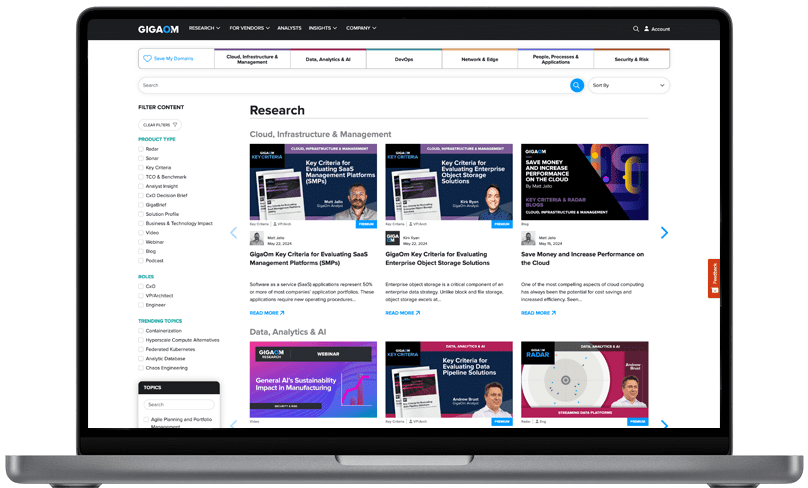Table of Contents
- Executive Summary
- Kubernetes Data Protection Sector Brief
- Decision Criteria Analysis
- Analyst’s Take
- Methodology
- About Joep Piscaer
- About GigaOm
- Copyright
1. Executive Summary
Kubernetes data protection encompasses data backup and recovery solutions that aim to protect Kubernetes-based applications in the cloud and on-premises by creating incremental copies of data to store in a separate storage target.
Kubernetes is the de facto platform for cloud-native applications, including those with stateful data. It is also gaining a foothold as the platform for traditional enterprise applications running both in the cloud and on-premises.
As applications and stateful data are inseparable, organizations need data protection solutions for applications running on Kubernetes to protect against losing their data.
This includes traditional backup/recovery leveraging incremental snapshot technologies and policy-based management, as well as disaster recovery workflows, ransomware protection (and other data integrity features), and increasingly, data copy and migration management to aid copying data across a multicloud landscape.
Data protection solutions for Kubernetes-based workloads are applicable to any organization that runs applications with valuable stateful data on Kubernetes-based platforms, and they are usually deployed and managed by central IT teams that are responsible for an application’s Recovery time objective (RTO) and recovery point objective (RPO).
Business Imperative
As applications and stateful data are inseparable, organizations need data protection solutions for applications running on Kubernetes to protect against losing their data to ensure business continuity in case of cyberattacks, natural disasters, or data center/cloud failures.
Sector Adoption Score
To help executives and decision-makers assess the potential impact and value of a Kubernetes data protection solution deployment to the business, this GigaOm Key Criteria report provides a structured assessment of the Kubernetes data protection sector across five factors: benefit, maturity, urgency, impact, and effort. By scoring each factor based on how strongly it compels or deters adoption of Kubernetes data protection, we provide an overall Sector Adoption Score (see Figure 1) for Kubernetes data protection of 4.6 out of 5, with 5 indicating the strongest possible recommendation to adopt. This indicates that Kubernetes data protection is a credible candidate for deployment and worth thoughtful consideration.
The factors contributing to the Sector Adoption Score for Kubernetes data protection are explained in more detail in the Sector Brief section that follows.
Key Criteria for Kubernetes Data Protection Solutions
Sector Adoption Score
Figure 1. Sector Adoption Score for Kubernetes Data Protection
This is the fourth year that GigaOm has reported on the Kubernetes data protection space in the context of our Key Criteria and Radar reports. This report builds on our previous analysis and considers how the market has evolved over the last year.
This GigaOm Key Criteria report highlights the capabilities (table stakes, key features, and emerging features) and non-functional requirements (business criteria) for selecting an effective Kubernetes data protection solution. The companion GigaOm Radar report identifies vendors and products that excel in those capabilities and metrics. Together, these reports provide an overview of the category and its underlying technology, identify leading Kubernetes data protection offerings, and help decision-makers evaluate these solutions so they can make a more informed investment decision.
GIGAOM KEY CRITERIA AND RADAR REPORTS
The GigaOm Key Criteria report provides a detailed decision framework for IT and executive leadership assessing enterprise technologies. Each report defines relevant functional and non-functional aspects of solutions in a sector. The Key Criteria report informs the GigaOm Radar report, which provides a forward-looking assessment of vendor solutions in the sector.
